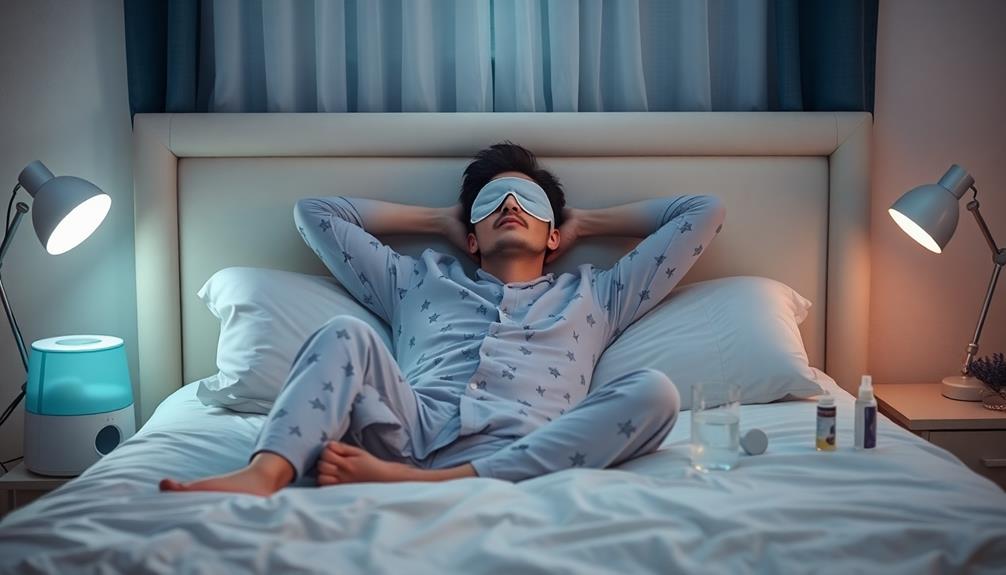To manage fatigue through better sleep and recovery, start by establishing a consistent sleep schedule and creating a relaxing bedtime routine. Optimize your sleep environment, limit screen time before bed, and practice stress-reduction techniques. Regular exercise and a balanced diet can also improve your sleep quality. Stay hydrated throughout the day and take strategic power naps when needed. Prioritize rest and recovery by taking breaks and making time for activities that help you recharge. By implementing these strategies, you'll be well on your way to combating fatigue and improving your overall well-being. Discover more in-depth information on each tip to maximize your results.
Core Insight
- Establish a consistent sleep schedule by setting fixed bedtimes and wake-up times, even on weekends.
- Create a relaxing bedtime routine that includes dimming lights, avoiding screens, and practicing calming activities.
- Optimize your sleep environment by keeping the bedroom cool, dark, and quiet with comfortable bedding.
- Limit screen time before bed and avoid blue light exposure from electronic devices.
- Prioritize regular exercise, but finish workouts at least three hours before bedtime to promote better sleep.
Establish a Consistent Sleep Schedule
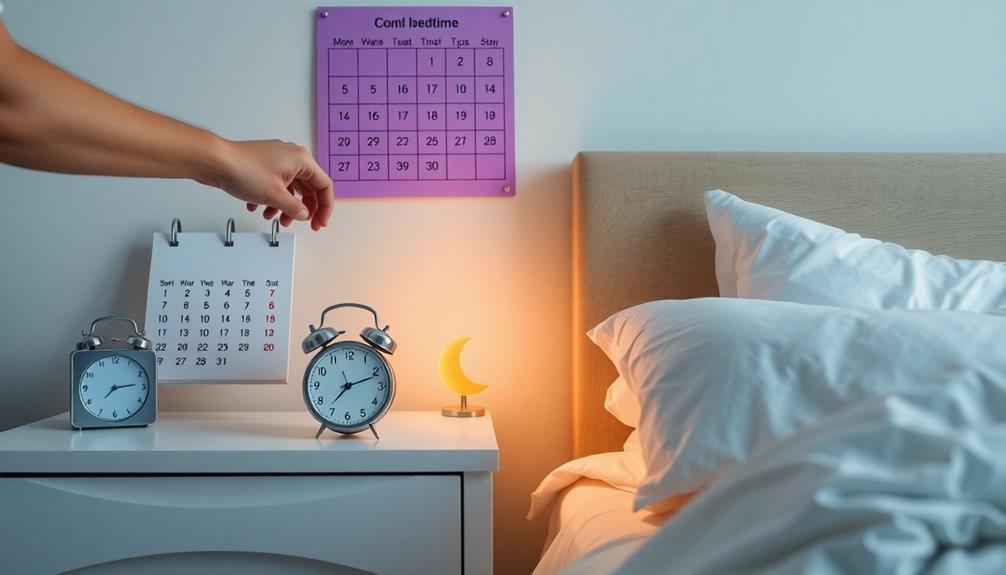
Why is a consistent sleep schedule so important? Your body's internal clock works best when you have a regular routine. Going to bed and waking up at the same times every day helps your body know when to expect sleep. This makes it easier to fall asleep and wake up. A peaceful bedroom can also help you sleep better. Using an essential oil diffuser with calming scents can be part of your bedtime routine.
To create a consistent sleep schedule:
- Pick a bedtime and wake-up time that fit your daily life.
- Follow these times every day, even on weekends.
- Have a relaxing routine before bed to tell your body it's time to sleep.
- Stay away from screens for at least an hour before bed. The blue light can mess with your sleep.
- Be patient. It might take a few weeks for your body to get used to the new schedule.
Create a Relaxing Bedtime Routine
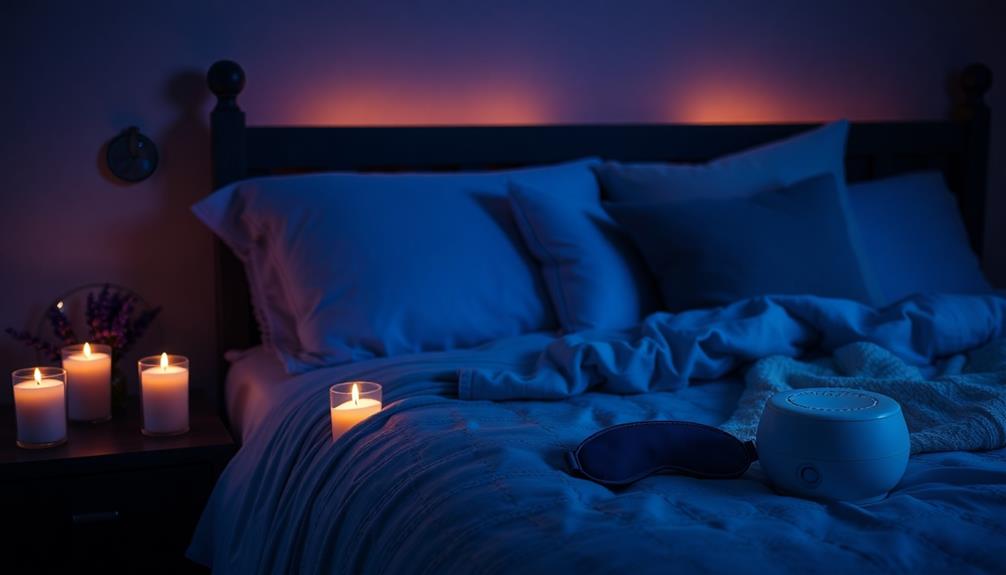
Winding down before bed is key to getting a good night's sleep. Set aside some time each night to relax. Dim the lights and stay away from screens. The blue light can mess with your sleep cycle. A warm bath or shower can help you feel sleepy. Try using a diffuser with lavender or chamomile oil to relax even more.
Deep breathing, stretching, and meditation are great ways to relax. Reading or listening to calming music can quiet your mind. Avoid stimulating activities, big meals, and caffeine before bed.
Make your bedroom a comfy place to sleep. Keep it cool, dark, and quiet. Use bedding and pillows that support your body. Stick to your bedtime routine, even on weekends. This will help you build healthy sleep habits.
Optimize Your Sleep Environment
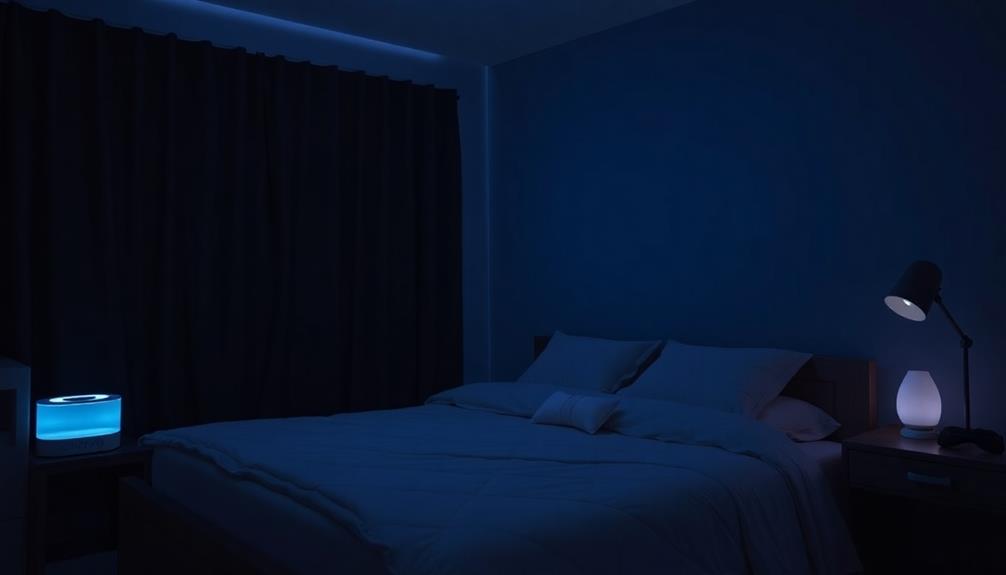
Keep your bedroom cool, around 60-67°F (15-19°C). Make the room as dark as possible with blackout curtains or an eye mask. A comfortable mattress and pillows that support your sleeping position are important. Use earplugs or a white noise machine if it's noisy. Don't keep electronic devices in your bedroom because their blue light can disrupt your sleep. Try using calming scents like lavender for relaxation. A clean, clutter-free bedroom creates a peaceful atmosphere. By making your sleep environment right for you, you'll sleep better and feel more rested.
Limit Screen Time Before Bed
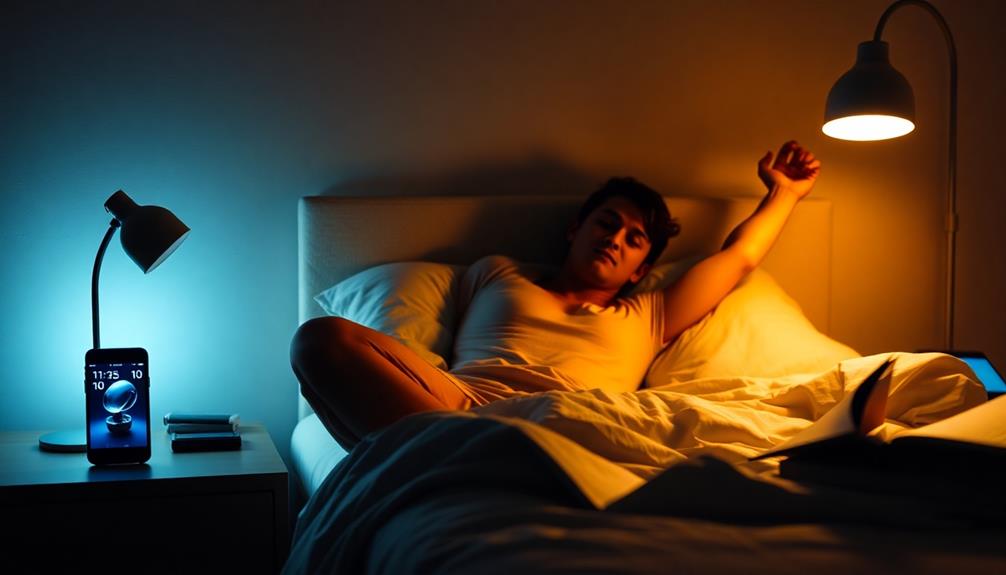
Limiting screen time before bed is crucial for getting a good night's sleep. The blue light from phones, tablets, and computers can mess with your body's natural sleep cycle. Aim to avoid screens for at least an hour before hitting the hay. If you need to use a device, try a blue light filter or night mode.
Follow this simple plan to cut back on screen time before bed:
| Time before bed | Action |
|---|---|
| 2 hours | Wrap up any work on your devices |
| 1 hour | Turn off all screens |
| 30 minutes | Unwind with a book or some relaxation exercises |
Practice Stress-Reduction Techniques
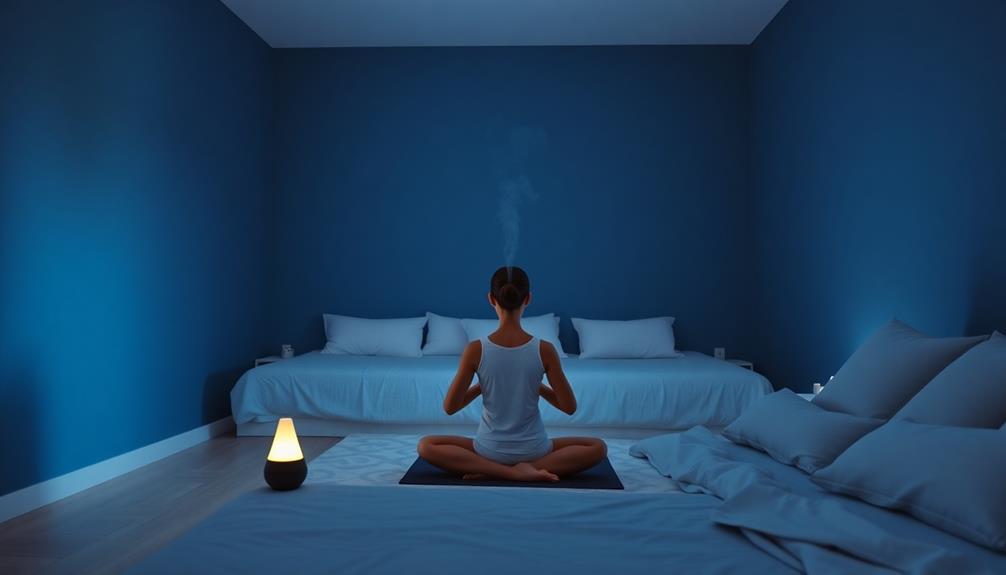
Reducing stress is a key way to sleep better. Adding relaxation methods to your daily routine can calm you and get your body ready for rest. These techniques will improve your sleep and overall wellness. Natural sleep aids like herbal teas and essential oils can boost relaxation even more.
Try these effective ways to reduce stress:
- Deep breathing
- Gradually relaxing your muscles
- Mindful meditation
- Light yoga or stretching
Exercise Regularly
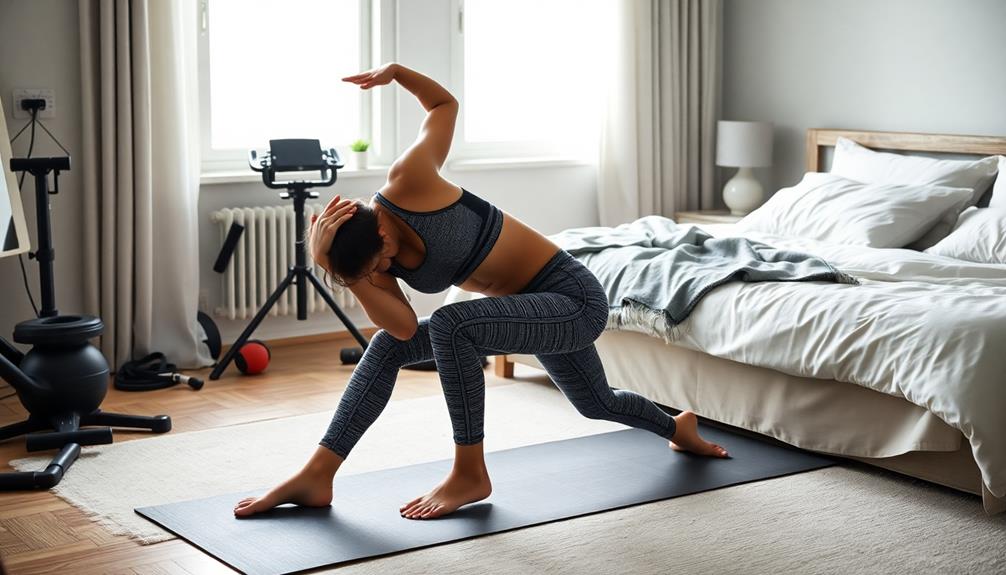
Regular exercise is key to fighting fatigue and sleeping better. Try to get at least 30 minutes of moderate activity, like brisk walking, swimming, or biking, most days of the week. You don't have to go all out at the gym to see benefits.
Working out helps keep your body's internal clock in sync, making it easier to fall asleep at night. It also helps reduce stress and anxiety, which often cause sleep problems. Just be sure to finish exercising at least three hours before bed so your body has time to cool down and relax.
Manage Your Diet
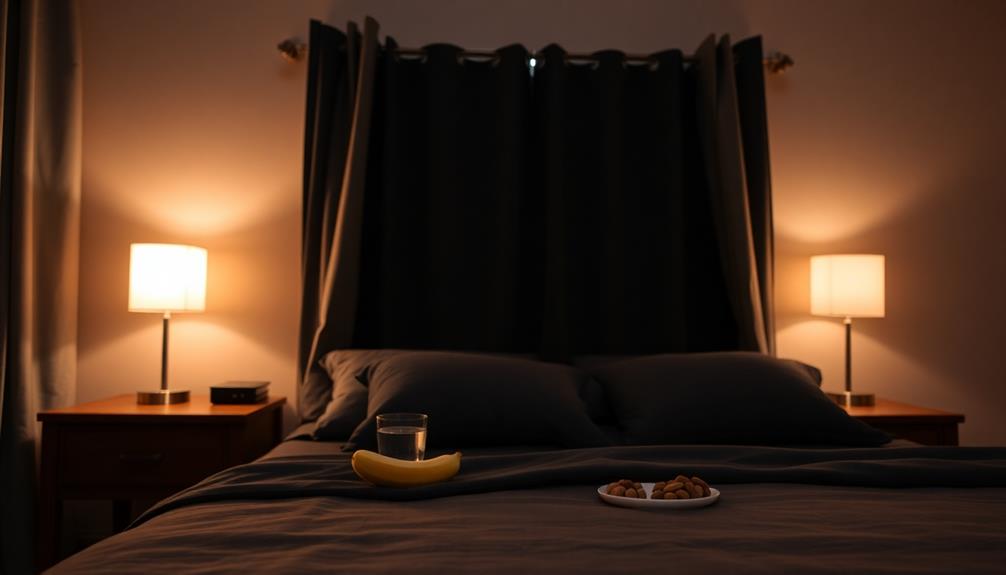
Your diet is just as important as exercise for managing fatigue and sleeping better. Eat foods that are packed with nutrients to boost your energy and help you get restful sleep. Load up on fruits, veggies, lean proteins, and whole grains at mealtime. Coconut water can be a great addition to your diet. It gives you natural electrolytes and keeps you hydrated, which helps fight fatigue. Coconut water has lots of potassium and not much added sugar, so it's perfect for replacing lost nutrients and keeping you healthy.
To make your diet work for better sleep and less fatigue:
- Cut back on caffeine, especially later in the day
- Don't eat big meals right before bed
- Drink plenty of water all day long
- Think about adding foods that promote sleep, like cherries, nuts, and fatty fish
Watch how much alcohol you drink, since it can mess with your sleep patterns. Try herbal teas or warm milk before bed instead. Making these changes to your diet will help your body's natural rhythms and energy levels. That way, you can fight fatigue and get better sleep overall.
Stay Hydrated Throughout the Day
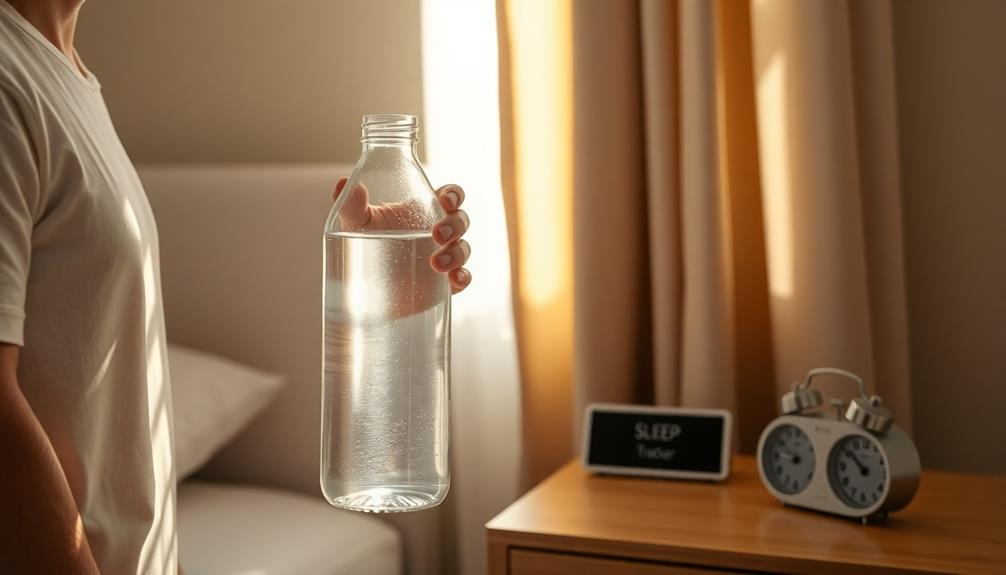
Drinking enough water is important for reducing tiredness and sleeping better. Aim to drink water often during the day, even when you're not thirsty. Carry a water bottle with you and set reminders to drink. Most people need about eight glasses a day, but you may need more if you exercise a lot or live somewhere hot. Sports drinks can help replace electrolytes and make you absorb water better when you're very active or sweating a lot.
Don't wait until you're super thirsty to drink. If you do, you're already dehydrated. Get in the habit of drinking water with meals and between them. If plain water is too boring, add fruit or herbs to it for flavor. Remember that drinks with caffeine or alcohol can dehydrate you, so drink extra water to make up for them. Drinking enough water will help you feel more awake and focused during the day.
Take Strategic Power Naps
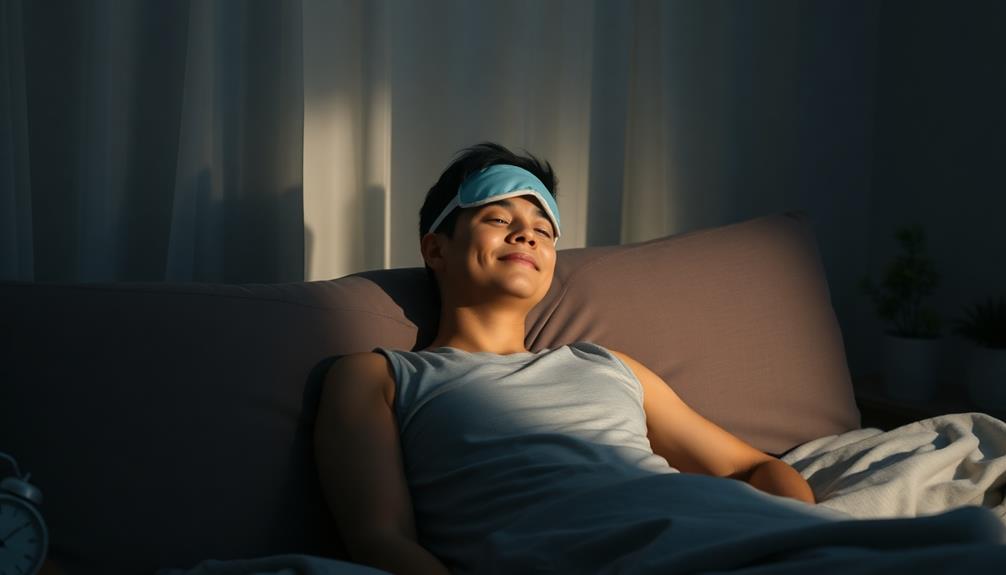
Power naps can help you manage fatigue and be more productive. To get the most out of a power nap:
- Nap for 10-20 minutes. This keeps you from falling into deep sleep.
- Nap between 1-3 PM. Early afternoon is the best time.
- Nap in a quiet, dark place. This helps you relax.
- Set an alarm so you don't nap too long.
Power naps can make you more alert, improve your thinking, and boost your mood. They help a lot when you feel sleepy or can't focus. Essential oil diffusers can make napping even better by helping you relax. But don't use naps to replace sleep at night. If you always need naps to get through the day, you may need to look at your sleep habits. Power naps should be used along with good nighttime sleep, not instead of it.
Prioritize Rest and Recovery

Prioritizing rest and recovery is key to managing fatigue. Balance work, physical activity, and downtime. Take regular breaks during the day, even if they're short. Use this time to step away from tasks, stretch, or do deep breathing exercises. Try natural sleep aids like lavender or chamomile tea to relax and improve sleep.
Aim for 7-9 hours of sleep each night. Create a consistent bedtime routine to signal your body it's time to rest. Cut back on screen time before bed, as blue light can mess with your sleep cycle.
On days off, don't overbook yourself. Make time for activities that help you recharge, like reading, being outdoors, or enjoying a hobby. Remember, proper rest isn't being lazy—it's essential for your health and productivity.
Frequently Asked Questions
How Does Altitude Affect Sleep Quality and Fatigue Levels?
At higher altitudes, you'll experience lower oxygen levels, which can disrupt your sleep patterns and increase fatigue. You may have trouble falling asleep, wake up frequently, and feel more tired during the day. Acclimatization can help over time.
Can Certain Medications Impact Sleep Patterns and Energy Levels?
Yes, certain medications can greatly impact your sleep patterns and energy levels. You'll find that some drugs cause drowsiness, while others may lead to insomnia. It's important to discuss potential side effects with your doctor.
What Role Do Hormones Play in Managing Fatigue and Sleep Cycles?
Hormones play an essential role in your sleep-wake cycle and energy levels. They regulate your circadian rhythm, influence melatonin production, and affect stress responses. Imbalances can lead to fatigue, insomnia, or excessive sleepiness. You'll want to maintain hormonal balance.
How Does Shift Work Affect Sleep Patterns and Fatigue Management?
Shift work disrupts your body's natural circadian rhythm, making it harder for you to fall asleep and stay alert. You'll likely experience increased fatigue, reduced performance, and potential health issues. It's essential to prioritize sleep hygiene and recovery strategies.
Are There Genetic Factors That Influence Individual Sleep Needs and Fatigue Resistance?
Yes, your genes play a role in your sleep needs and fatigue resistance. You'll find that genetic variations can affect your circadian rhythm, sleep duration requirements, and how quickly you feel tired. Everyone's sleep profile is slightly different.

